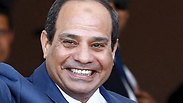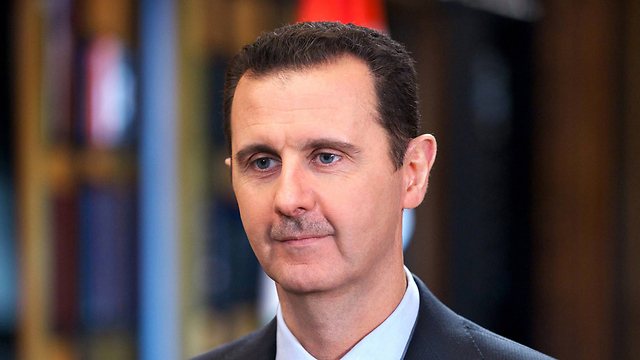
Egyptian President Abdel Fattah al-Sisi. 'A fantastic guy'
צילום: רויטרס
Trump’s win puts a smile on al-Sisi and Assad’s faces
Analysis: The Egyptian leader expects Washington to stop nagging Cairo on human rights issues, and the Syrian president believes his problem will be solved once the new American president teams up with Russia’s Putin.
What do they really know? The Arab world’s finest experts and most senior commentators sat down over the weekend to explain US President-elect Donald Trump’s future conduct on Middle Eastern affairs . Some took it one step further and offered him advice: What to do with ISIS, how to handle Syrian President Bashar Assad. They prepared scenarios on Arab oil affairs and mapped “the enemies” versus “the good guys.”

There was one motif which repeated itself in dozens of articles: By a majority of votes, the commentators insist that Trump will not keep his promise to move the American Embassy from Tel Aviv to Jerusalem. Another motif which quite a few commentators stressed was the smile on Abdel Fattah al-Sisi’s face when he learned of the election results.

Syrian President Bashar Assad. Believes the new US president won’t find the time and won’t have any interest in dealing with him (Photo: AP) (צילום: AP)
The Egyptian president broke a world record: He is the first leader who got hold of Trump the moment after he won. Egyptian officials reported that it was “a good conversation” and that the Egyptian president invited the American president-elect to Cairo. But we should pay attention to the fact that Trump did not use the opportunity to respond in kind and invite al-Sisi to Washington. Prime Minister Benjamin Netanyahu on the other hand, says he has already been invited.
There is a huge gap between the Egyptian street’s indifference towards the US election results and al-Sisi’s smile. For Trump, he will remain “the fantastic guy,” as he defined him during their meeting in New York, and “there was good chemistry” also. This means that Washington will stop nagging Cairo on human rights issues. On the other hand, it doesn’t say anything about the extent of the Trump administration’s involvement in helping the Egyptian regime survive.
The Arab world did not expect Trump to win the elections, although it hated the outgoing Democratic regime’s conduct. Hillary Clinton, President Barack Obama’s secretary of state, was blamed for the push that led to the overthrow of four Arab tyrants, America’s allies: Zine El Abidine Ben Ali in Tunisia, Hosni Mubarak in Egypt, Ali Abdullah Saleh in Yemen and Muammar Gaddafi in Libya. Washington was accused of having no clue on how to run a state in the Arab world, and Obama was portrayed as coveting Iraq and Iran’s oil wells at the expense of the alliance with Saudi Arabia.
In the meantime, Iran has already sent its foreign minister, Mohammad Javad Zarif, to threaten Trump. We have other ways to preserve the nuclear agreement, announced the person who headed the Iranian negotiating team. Other ways are a code name for the trouble Iran could give the person who referred to the nuclear agreement as “the worst deal ever negotiated” and swore to deal with the document which was signed by the United States, Russia, China, France, Britain, Germany and the European Union.
Bashar Assad, on his part, is probably satisfied. He estimates that the new American president won’t find the time and won’t have any interest in dealing with him. First of all, because of his declaration that the war on ISIS is more important, and second, because he is expected to team up with Russian President Vladimir Putin. If that happens, Assad’s problem will be taken care of. Indeed, the Syrian rebels are already showing signs of pressure.
On the Israeli side, the Trump era opens a window of opportunities, at least until mid-January. During this period, Netanyahu will be able to ride on his image in the Arab world as a leader with an open door to the new president – as they both see eye-to-eye on the threats and the interests.
On the American side, Trump’s promise in his victory speech – to restore America’s greatness – should be taken seriously. This is actually where we can find a thick hint regarding the new list of priorities: America first, and the others can stand in line. The conflict with the Palestinians will be put in the fridge, Trump will help al-Sisi remain "the fantastic guy,” and the Saudis can go looking for him.
Who really lost big time? The women in the Arab world. Clinton’s defeat catches them in the middle of a journey. Trump won’t try to upgrade their status. Behind the veil and without one, they have no one to turn to and no one to trust.










